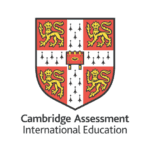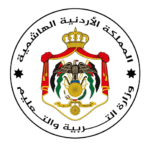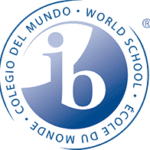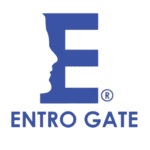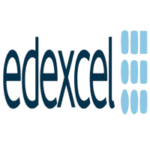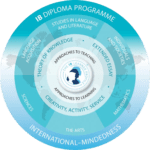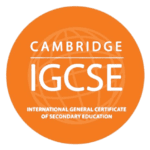Our Programs
Meet Mohammad Al Natour - Academic director & IBDP coordinator
IGCSE Program
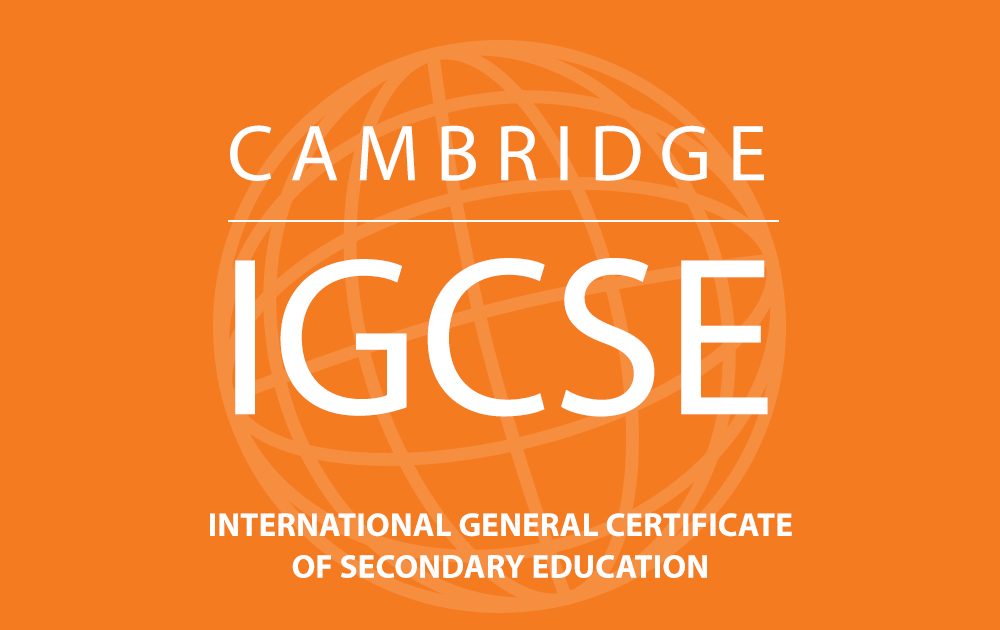
Lower Secondary Stage
The IGCSE (International General Certificate of Secondary Education) is an English language-based secondary qualification based on the British curriculum (GCSE) but adapted for a more internationally-focused student body.
Lower Secondary Years (Grades 6 - 8)
Grades 6, 7, and 8 form the lower secondary years in the IG program. They follow the primary stage (Grades K-5) and progress to Upper Secondary, then the Cambridge Advanced stage.
The program is designed to deliver a broad and balanced international curriculum that suits our school's context, culture, and ethos. It is intellectually challenging and cultivates creativity while instilling respect for other cultures. The international approach to learning encourages students to develop higher-order thinking skills while preparing them to thrive in an increasingly global environment.
The program is highly regarded and valued by leading universities and other educational institutions worldwide. The rigorous curricula, continually reviewed by international experts and institutions, give students a solid foundation for further education.
The program is designed to deliver a broad and balanced international curriculum that suits our school's context, culture, and ethos. It is intellectually challenging and cultivates creativity while instilling respect for other cultures. The international approach to learning encourages students to develop higher-order thinking skills while preparing them to thrive in an increasingly global environment.
The program is highly regarded and valued by leading universities and other educational institutions worldwide. The rigorous curricula, continually reviewed by international experts and institutions, give students a solid foundation for further education.
High School Stage (Grades 9 - 12)
This stage is designed to empower students to:
1. Prepare for university and future endeavors.
2. Actively engage in a rapidly evolving, knowledge-based global society.
3. Select courses that align with their educational objectives.
4. Participate in both individual and collaborative projects.
5. Adopt behaviors that promote success.
6. Cultivate a diverse range of interests and skills.
7. Navigate the challenges associated with university admissions.
8. Recognize and fulfill their responsibilities as members of their family, community, nation, and the world.
9. Actively participate in community service and initiate service projects.
10. Maintain healthy practices related to nutrition, environment, and study habits.
Students attend eight classes daily, with each class lasting 45 minutes.
1. Prepare for university and future endeavors.
2. Actively engage in a rapidly evolving, knowledge-based global society.
3. Select courses that align with their educational objectives.
4. Participate in both individual and collaborative projects.
5. Adopt behaviors that promote success.
6. Cultivate a diverse range of interests and skills.
7. Navigate the challenges associated with university admissions.
8. Recognize and fulfill their responsibilities as members of their family, community, nation, and the world.
9. Actively participate in community service and initiate service projects.
10. Maintain healthy practices related to nutrition, environment, and study habits.
Students attend eight classes daily, with each class lasting 45 minutes.
High School Programme Options
Beginning in Grade 9, students may select from the following programs:
1. National Programme: Jordanian High School Certificate (Tawjihi) - Scientific and Literary Streams
2. British Programme: International General Certificate of Secondary Education (IGCSE), International A-Level offered by Pearson Edexcel, Cambridge, and Oxford AQA.
3. International Baccalaureate Diploma Programme (IBDP)
1. National Programme: Jordanian High School Certificate (Tawjihi) - Scientific and Literary Streams
2. British Programme: International General Certificate of Secondary Education (IGCSE), International A-Level offered by Pearson Edexcel, Cambridge, and Oxford AQA.
3. International Baccalaureate Diploma Programme (IBDP)
Curriculum and Learning Approach
The IGCSE curriculum encourages individual development and growth through various learning methods. It follows a hands-on and project inquiry-based learning approach, enabling students to learn by solving problems and gaining a deeper understanding of the subjects. The curriculum combines an in-depth study of subjects with the development of skills essential for higher education and work.
This practical approach encourages students to:
· Think critically
· Solve problems
· Engage in independent research
· Collaborate on projects
· Present arguments based on evidence
The active learning approach not only inspires students to become invested in the process but also promotes the development of valuable transferable skills that last a lifetime.
This practical approach encourages students to:
· Think critically
· Solve problems
· Engage in independent research
· Collaborate on projects
· Present arguments based on evidence
The active learning approach not only inspires students to become invested in the process but also promotes the development of valuable transferable skills that last a lifetime.
Assessment
A range of assessments provided by the program helps prove and improve learning, in addition to formative and summative tests at the end of each unit. Key assessments include:
· Progression Tests: Provided by Cambridge at the end of each stage to ensure students have attained the learning objectives of that stage of the program.
· FLS Tests (The Frere Lower Secondary Tests): Provided by the school in place of the Checkpoint Tests, these are administered at the end of the lower secondary stage (Grade 8). These tests ensure learners have not only covered the learning objectives of the stage but are also prepared for the IGCSE next level in Grades 9 and 10. The FLS Exam is counted as the final Exam Mark for Grade 8 IG Students
· Progression Tests: Provided by Cambridge at the end of each stage to ensure students have attained the learning objectives of that stage of the program.
· FLS Tests (The Frere Lower Secondary Tests): Provided by the school in place of the Checkpoint Tests, these are administered at the end of the lower secondary stage (Grade 8). These tests ensure learners have not only covered the learning objectives of the stage but are also prepared for the IGCSE next level in Grades 9 and 10. The FLS Exam is counted as the final Exam Mark for Grade 8 IG Students
National Program

Overview
This program is primarily conducted in Arabic and encompasses all subjects mandated by the Jordanian Ministry of Education, offering various options across different fields. French is also available as an optional subject for all students. The Tawjihi program spans two years (11th and 12th grades); 11th graders study and sit for four humanities subjects, while 12th graders study and sit for an additional four subjects based on their chosen field.
For more details on the Tawjihi:
• Head of Stage (9-12): Mr. Majdi Twal
• Email: majdi.twal@lasallejordan.org
For more details on the Tawjihi:
• Head of Stage (9-12): Mr. Majdi Twal
• Email: majdi.twal@lasallejordan.org
Curriculum and Assessment
The curriculum is designed to ensure that students gain a solid foundation in all required subjects. Assessment is conducted through a combination of formative tests and summative tests at the end of each month, allowing for continuous evaluation of student progress and understanding.
Recognition and Advancement
The National Program is highly regarded by both national and international universities. Recent advancements in the program have focused on meeting the educational needs of each student with a more flexible approach, simulating international programs. This makes the program both rigorous and adaptable, fostering academic excellence and personal growth.
Learning Strategies
The National Program incorporates learning strategies and approaches from international programs, emphasizing active learning and project-based learning. These strategies not only engage students in their studies but also encourage critical thinking, creativity, and collaboration.
National and International Identity
While the National Program emphasizes the importance of maintaining a strong national identity, it also nurtures an international mindset. This dual focus ensures that students are well-prepared for the global stage, equipped with the skills and knowledge necessary to succeed in an increasingly interconnected world.
Middle Years Programme (MYP)
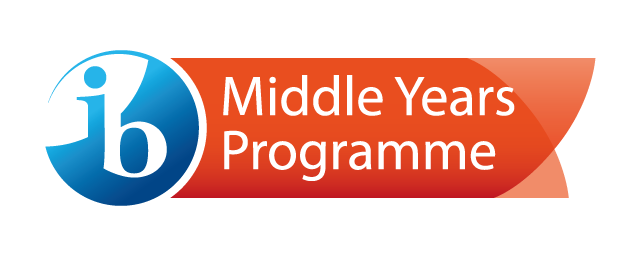
International Baccalaureate
The IB/MYP is an international program designed to foster lifelong learners. It is a comprehensive program that cultivates students' curiosity, communication, and creativity. The MYP allows students to explore their potential, learning preferences, take appropriate risks, and develop a strong personal identity. The curriculum is concept-driven and inquiry-based, ensuring that learning always takes place in context.
Teaching Philosophy
The MYP is student-centered, focusing on inquiry-based approaches and authentic real-life learning. We aim to nurture lifelong learners who are principled, open-minded, caring, knowledgeable, risk-takers, and thinkers. Each subject in the MYP highlights its application in real-life settings, giving it more depth and meaning. We help students understand why they are learning what they are learning.
Homework Policy
Students receive daily homework assignments, with 2 to 3 tasks each day. Mathematics requires daily practice to ensure students keep up with the progression and complexity of the units. Saturdays are family days with no homework, but students are encouraged to revise their material and read literary works for their Language and Literature courses.
Academic Honesty
Academic honesty is crucial to our system, ensuring that all student work is 100% authentic. We value honesty and high principles and work to instill these values in our students' academic efforts.
Our Assessments
We have three types of assessments:
· Formative Assessments: Ongoing and part of the learning process, including worksheets and formal formative assessments preceding summative assessments. They provide detailed feedback without grades.
· Summative Assessments: Conducted at the end of units, relating to real-life situations. Each subject is assessed according to four main criteria, with achievement levels from 1 to 7.
· Remedial Assessments: For students scoring achievement level zero or 1-2 throughout the year, conducted during the summer break. If improvement is not achieved, a formal meeting with parents discusses action plans.
· Formative Assessments: Ongoing and part of the learning process, including worksheets and formal formative assessments preceding summative assessments. They provide detailed feedback without grades.
· Summative Assessments: Conducted at the end of units, relating to real-life situations. Each subject is assessed according to four main criteria, with achievement levels from 1 to 7.
· Remedial Assessments: For students scoring achievement level zero or 1-2 throughout the year, conducted during the summer break. If improvement is not achieved, a formal meeting with parents discusses action plans.
Student-led Conferences
Parent-teacher meetings are led by students, who discuss their achievements, strengths, and weaknesses. Teachers provide further guidance and support during these conferences.
Interdisciplinary Unit (IDU)
Students engage in an IDU annually, showcasing the connections between subjects through collaborative planning and assessment. At the end of these units, students plan a celebration to present their learning journey to peers and parents.
Service as Action
Aligned with the IB philosophy of creating caring individuals, students serve their community based on observed needs, connecting their service to the subjects they learn.
Laptops
Students bring their laptops daily, with designated shelves to store books and copybooks. Online versions of books and PowerPoint presentations are provided to facilitate home study.
Approaches to Learning (ATL)
ATL skills help students "learn how to learn," classified into 5 categories and 10 clusters, with over a hundred skills. These skills are integrated into daily learning experiences and are further developed through extra activities during homeroom periods. ATL skills are not graded but are reflected upon for improvement with teachers' assistance.
Personal Project
In Grade 10, students complete a personal project, a long-term assignment based on personal interest. This project demonstrates students' abilities and skills, involving inquiry, action, and reflection. Each student is guided by a faculty supervisor and the personal project coordinator.
General Assessment Policy
Students undergo continuous formative assessments and monthly summative tests. For special programs, progression tests and FLS Tests in the IG Program measure performance against program standards. The IB/MYP includes midterms and finals, with continuous assessments throughout units. A 100-point scale is used, with 60% from the first three months and 40% from the final exam. Students scoring below 50% must take make-up exams. Report cards are published on the B12 platform.
Inclusion Policy
We maintain high standards and believe all students can achieve. For students who fall behind, experienced teachers provide support through differentiated instruction and assessments, ensuring no student is left out.
Communication with Parents
Parents play a crucial role in the learning process. We engage them through the PTA, general meetings, and individual sessions. The B12 platform is the primary communication tool for formal announcements. Weekly newsletters on Google Classroom provide updates on covered material, homework, and assessments. Parents can also communicate via the landline for any concerns.
IBDP Program
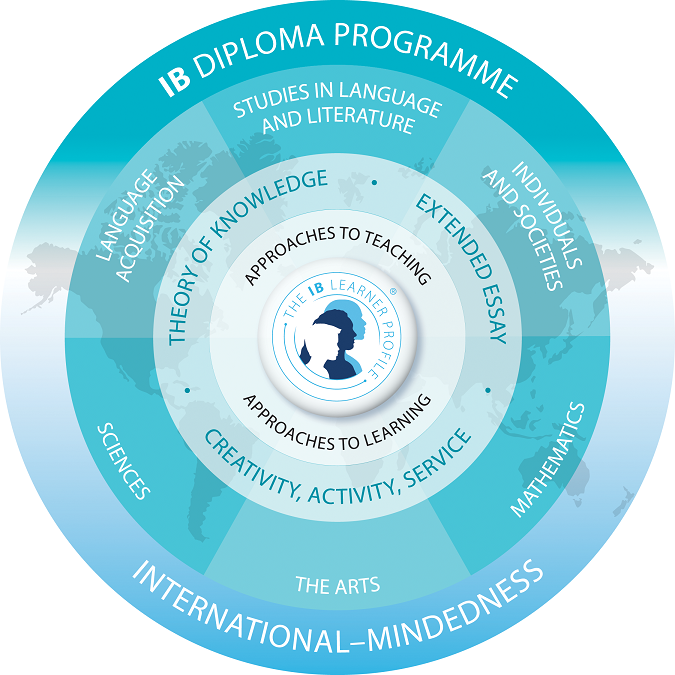
Overview
Our school became an "IB World School" in March 2018, authorized to offer the IBDP, with the first cohort graduating in 2021. This program, primarily taught in English, allows students to select subjects tailored to their Jordanian Equivalency. Acceptance into the program requires passing an entrance examination and an interview.
For details regarding the IBDP:
• IB Coordinator: Mr. Mohammad Al Natour
• Email: mohammad.alnatour@lasallejordan.org
For details regarding the IBDP:
• IB Coordinator: Mr. Mohammad Al Natour
• Email: mohammad.alnatour@lasallejordan.org
Group 1: Studies in Language and Literature
· Language A: Literature (Arabic and English)
Group 2: Language Acquisition
· Language B (Arabic and English)
· Language ab initio (for beginners, if applicable)
· Language ab initio (for beginners, if applicable)
Group 3: Individuals and Societies
· Business Management
· Economics
· Psychology
· Economics
· Psychology
Group 4: Sciences
· Chemistry
· Biology
· Physics
· Design Technology
· Biology
· Physics
· Design Technology
Group 5: Mathematic
· Mathematics: Analysis and Approaches
· Mathematics: Applications and Interpretations
· Mathematics: Applications and Interpretations
Group 6: The Arts
· Visual Arts
Core Requirements
· Extended Essay (EE): An independent, self-directed research, culminating in a 4,000-word paper.
· Theory of Knowledge (TOK): A course exploring the nature of knowledge across disciplines, fostering an appreciation of different cultural perspectives.
· Creativity, Activity, Service (CAS): A project that integrates creativity, physical activity, and community service, completed alongside academic studies.
· Theory of Knowledge (TOK): A course exploring the nature of knowledge across disciplines, fostering an appreciation of different cultural perspectives.
· Creativity, Activity, Service (CAS): A project that integrates creativity, physical activity, and community service, completed alongside academic studies.
Additional Attributes
· International-Mindedness: A fundamental principle of the IB, encouraging students to value their culture and that of others.
· Approaches to Teaching and Learning (ATL): Focuses on developing thinking, communication, self-management, research, and social skills.
All subjects are offered at both Higher and Standard Levels
· Approaches to Teaching and Learning (ATL): Focuses on developing thinking, communication, self-management, research, and social skills.
All subjects are offered at both Higher and Standard Levels

